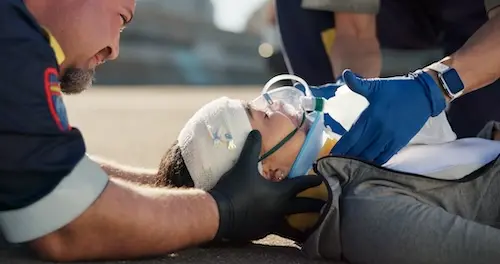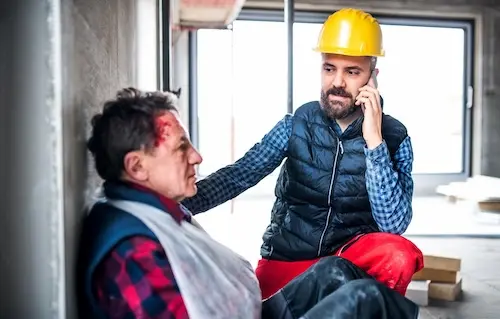Temporary vs. Permanent Disability Benefits in Miami: What’s the Difference?
Workers’ Compensation Lawyers Coalition is a dedicated legal team helping injured workers in Miami secure the workers’ compensation benefits they deserve. With experience handling temporary and permanent disability claims, we fight for fair compensation, guide clients through the application process, and appeal denied claims.
Workers injured on the job may qualify for temporary or permanent disability benefits under workers’ compensation laws in Florida. These benefits provide financial support based on the severity of the injury and the worker’s ability to return to work. Temporary disability benefits apply when a worker is expected to recover, while permanent disability benefits cover long-term impairments. Understanding the differences between temporary and permanent disability benefits helps injured workers know what to expect and how to secure fair compensation.
In this blog, we’ll explain how temporary and permanent disability benefits work, who qualifies, what to do if a claim is denied, and the importance of working with an experienced Miami workers’ compensation attorney.
Understanding Temporary Disability Benefits in Miami
Workers injured on the job may qualify for temporary disability benefits under workers’ compensation laws in Florida. These benefits help replace lost wages when an injured worker cannot perform their usual job duties due to a work-related injury or illness.
What Is Temporary Disability?
Temporary disability refers to a condition that prevents an injured worker from performing substantial gainful activity but is expected to improve with time and medical treatment. Florida’s workers’ compensation system provides financial support while the worker recovers.
A doctor must confirm that the injury prevents normal work duties. If the worker reaches maximum medical improvement and cannot return to work fully, the case may transition to permanent disability.
Types of Temporary Disability Benefits
Florida recognizes two types of temporary disability benefits under workers’ compensation:
- Temporary Total Disability (TTD): If a worker cannot perform any job duties, they may qualify for temporary total disability benefits. Payments are usually 66.67% of the worker’s average weekly wage, subject to a state maximum.
- Temporary Partial Disability (TPD): If a worker can perform limited duties but earns less than 80% of their pre-injury wages, they may qualify for temporary partial disability benefits.
Both benefits continue until the worker reaches maximum medical improvement, returns to work, or meets the state’s time limit.
How Long Do Temporary Disability Benefits Last?
Florida law limits temporary disability benefits to a maximum of 260 weeks (five years). However, benefits may end earlier if:
- A doctor determines the worker can return to full duty.
- The worker reaches maximum medical improvement and is evaluated for permanent disability.
- The worker returns to work and earns at least 80% of their previous income.
If benefits stop but the worker is still unable to earn a living, they may explore permanent disability benefits or Social Security Disability Insurance (SSDI benefits).
How to Apply for Temporary Disability Benefits
To qualify for temporary disability benefits, a worker must:
- Report the injury to their employer within 30 days.
- Seek medical treatment from an authorized healthcare provider.
- Ensure the doctor’s report confirms work limitations.
- Submit a compensation claim to the employer’s workers’ compensation insurance provider.
If a claim is denied, the worker may need legal assistance to appeal and secure benefits.
What Happens If Benefits Are Denied?
A claim may be denied due to missing documentation, disputes over the injury’s severity, or employer challenges. If temporary disability benefits are refused, the worker can:
- Request a reconsideration with additional medical evidence.
- File a workers’ compensation claim dispute with the Florida Division of Workers’ Compensation.
- Consult a workers’ compensation lawyer to fight for eligible benefits.
Permanent Disability Benefits in Miami
Workers who suffer a severe injury may qualify for permanent disability benefits if they cannot return to work. These benefits provide long-term financial support for individuals who experience a permanent impairment due to a work-related injury or illness.
What Is Permanent Disability?
Permanent disability occurs when a worker reaches maximum medical improvement (MMI) but still has lasting impairments that affect their ability to work. A doctor evaluates the worker’s condition and assigns an impairment rating to determine eligibility for benefits.
If a worker is unable to perform substantial gainful activity, they may qualify for Social Security Disability Insurance (SSDI benefits) in addition to workers’ compensation benefits.
Types of Permanent Disability Benefits
Florida recognizes two main types of permanent disability benefits under workers’ compensation:
- Permanent Partial Disability (PPD): If a worker can still perform some job duties but has a permanent impairment, they may receive compensation based on their impairment rating and previous wages.
- Permanent Total Disability (PTD): If a worker cannot perform any work due to their injury, they may qualify for permanent total disability benefits. Payments are typically 66.67% of their average weekly wage, subject to state limits.
How Are Permanent Disability Benefits Calculated?
The amount of permanent disability benefits depends on:
- The worker’s impairment rating assigned by a doctor.
- The worker’s average weekly wage before the injury.
- Whether the worker is eligible for other disability benefits, including SSI benefits or Social Security Disability.
Workers receiving permanent total disability may continue to receive payments for life if they remain unable to work.
How to Apply for Permanent Disability Benefits
To qualify for permanent disability benefits, an injured worker must:
- Reach maximum medical improvement as determined by a doctor.
- Obtain a permanent impairment rating.
- File a workers’ compensation claim with the employer’s insurance.
- Submit supporting medical conditions documentation.
If the claim is denied, workers can appeal the decision and seek legal help.
What Happens If Benefits Are Denied?
A permanent disability claim may be denied due to insufficient medical evidence, disputes over the impairment rating, or employer challenges. If a worker is denied benefits, they can:
- Request a re-evaluation from a different healthcare provider.
- File an appeal with the workers’ compensation board.
- Apply for Social Security Disability Benefits if they meet SSDI or SSI benefits requirements.
Seeking Legal Assistance for Permanent Disability Benefits
Permanent disability benefits can be difficult to secure without proper documentation. A workers’ compensation lawyer can help workers determine eligibility, gather medical evidence, and challenge denied claims. Legal support ensures injured workers receive the benefits they deserve.
Differences Between Temporary and Permanent Disability Benefits
Workers injured on the job may receive temporary or permanent disability benefits, depending on the severity of their condition and ability to return to work. Understanding the key differences helps injured workers determine what type of compensation they may qualify for.
Duration of Benefits
Temporary disability benefits provide short-term financial support while a worker recovers. These benefits last until a worker reaches maximum medical improvement (MMI) or returns to work. In Florida, temporary disability benefits are limited to 260 weeks (five years).
Permanent disability benefits are long-term and apply when a worker has a permanent impairment that prevents them from returning to their previous job. Permanent total disability (PTD) benefits may continue for life if the worker remains unable to perform substantial gainful activity.
Ability to Work
Workers receiving temporary disability benefits are expected to return to work once they recover. They may receive temporary total disability (TTD) if they cannot work at all or temporary partial disability (TPD) if they can perform light duties with reduced pay.
Permanent disability benefits apply when a worker’s injury prevents them from earning a living. Permanent partial disability (PPD) allows some injured workers to work in a limited capacity, while permanent total disability (PTD) applies when a worker can no longer work in any job.
Compensation Amount
Both temporary and permanent disability benefits are calculated based on a worker’s average weekly wage before the injury. Temporary disability benefits typically pay 66.67% of lost wages.
Permanent disability compensation depends on the worker’s impairment rating, work restrictions, and eligibility for other disability benefits, such as Social Security Disability Insurance (SSDI benefits) or SSI benefits.
Transition from Temporary to Permanent Disability
A worker receiving temporary disability benefits may transition to permanent disability if they reach MMI and still have lasting impairments. A doctor’s evaluation determines if the worker qualifies for permanent disability benefits. If they cannot return to work, they may need to apply for permanent total disability (PTD) or SSDI benefits.
Legal Considerations
Both temporary and permanent disability benefits require proper documentation. If a workers’ compensation claim is denied, workers may need legal assistance to appeal the decision. A workers’ compensation lawyer can help injured workers determine eligibility and secure the correct benefits.
Contact an Experienced Miami Workers’ Compensation Attorney Today!
If you are struggling to secure temporary or permanent disability benefits or your workers’ compensation claim has been denied, our team at Workers’ Compensation Lawyers Coalition can help. We have the experience to guide you through the application process, fight for your rights, and ensure you receive the compensation you deserve.
Contact us at (786) 686-2857 for a free case consultation today!







